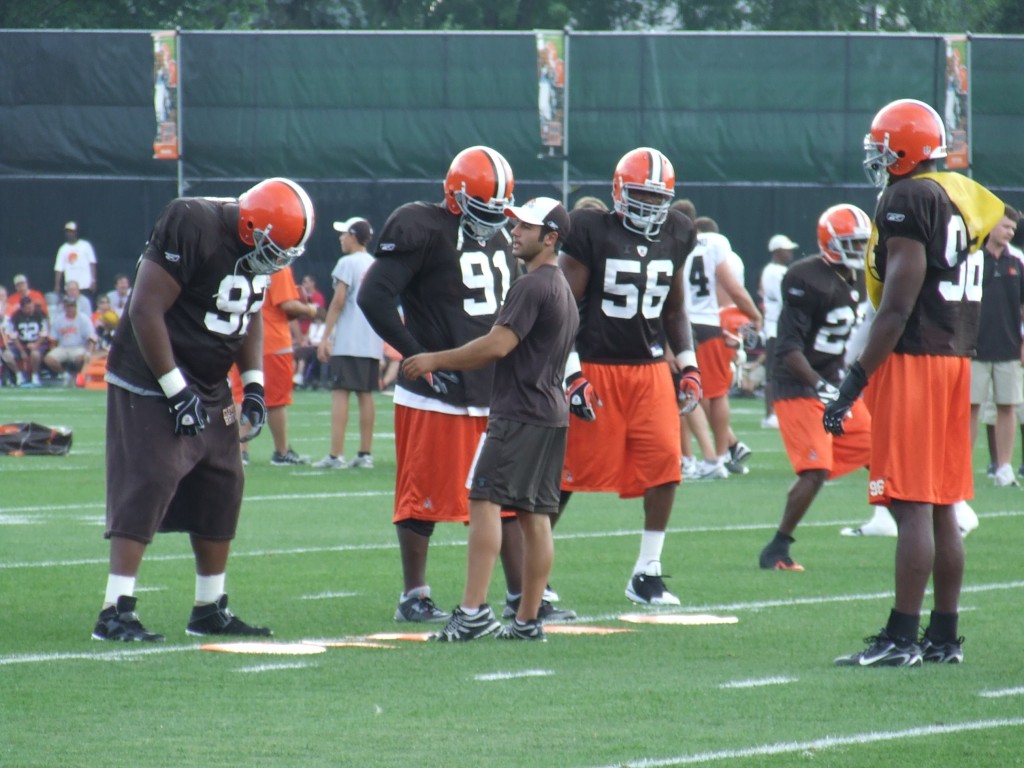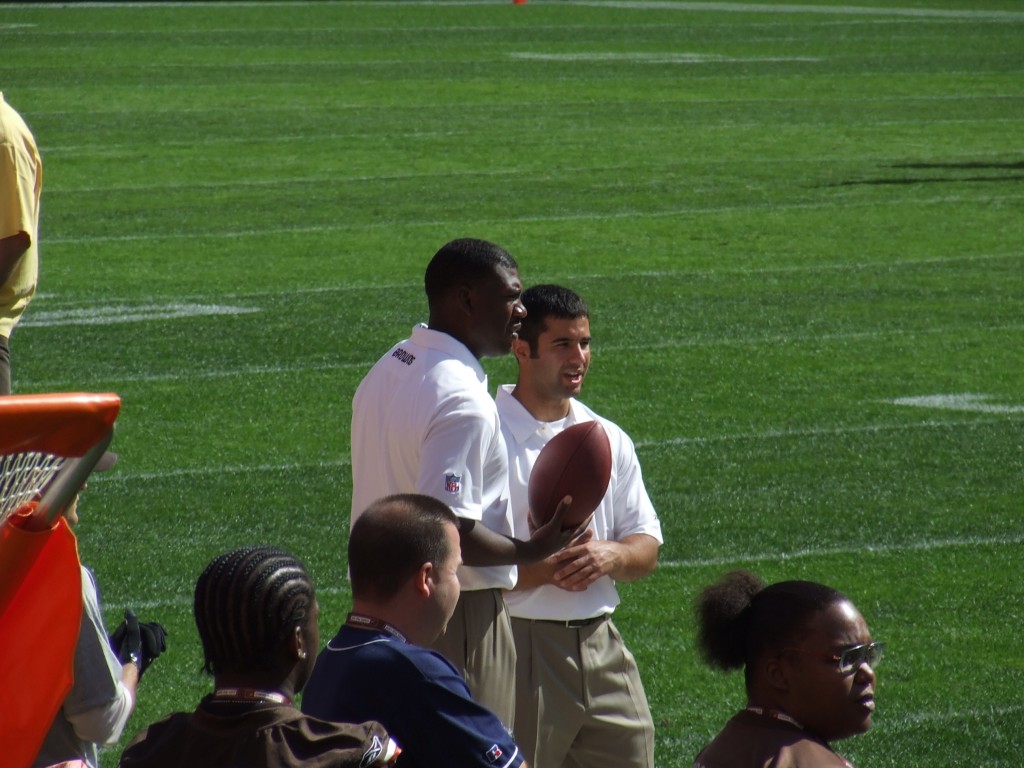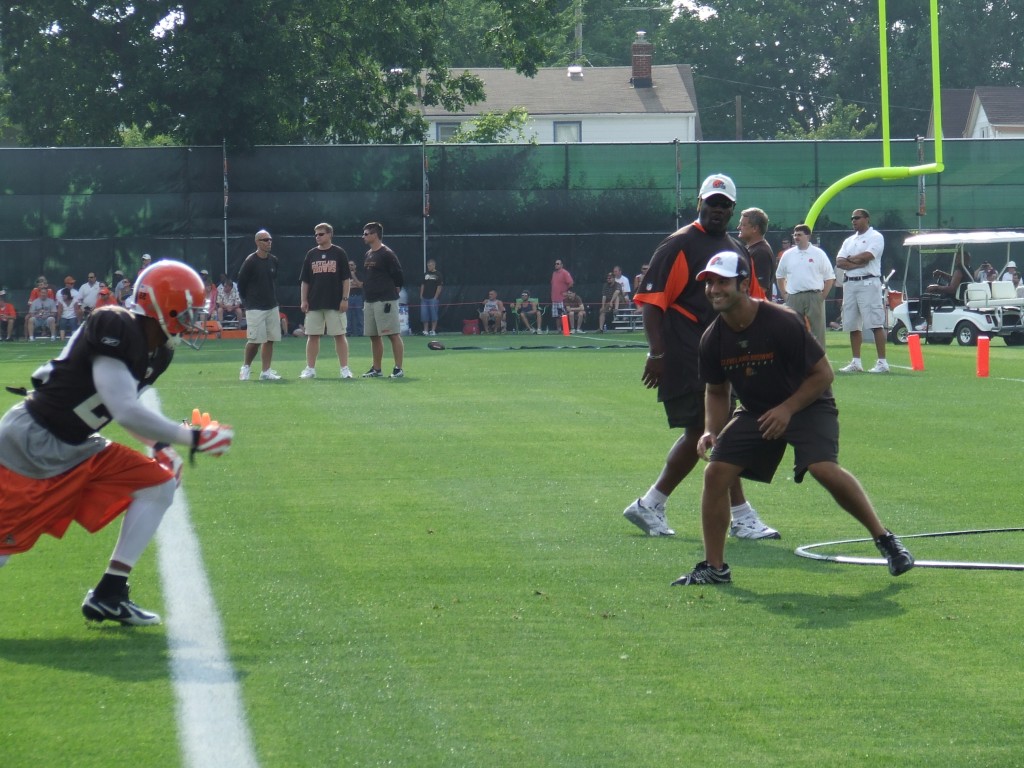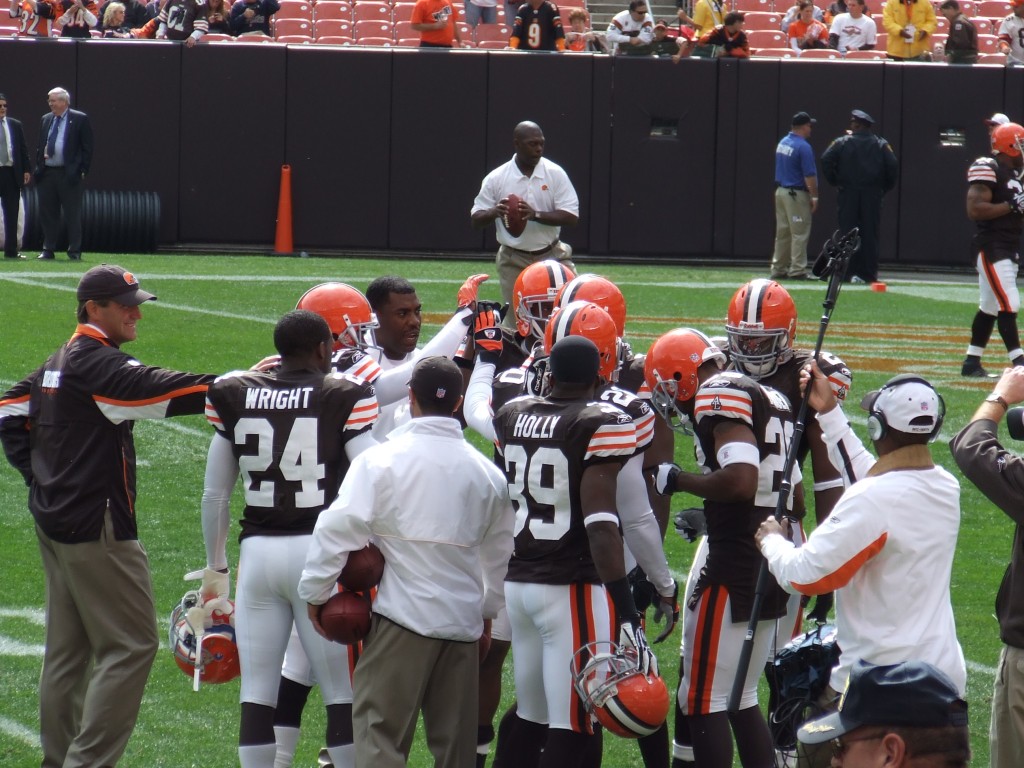57 Meditations on Kicking @$$ in Business and Life"4.8/5 stars" on Amazon
5 Easy Tips On How To Be Successfully Prepared (From An NFL Coach)
Tweet 3 Comments[My new friend Umberto Leone was an Assistant Coach in the NFL for the Cleveland Browns and Oakland Raiders; he wrote the article on preparation below (with some editing for space by me).]
As U.S. President Abe Lincoln once said about the importance of being prepared:
“If I had 6 hours to chop down a tree, I’d spend 4 hours sharpening my axe.”

Coach Leone corralling the Cleveland Browns
As a former Assistant Coach in the National Football League for five seasons, as well as three years assisting on the collegiate level, my work-life revolved around preparation.
I learned some valuable tips & pointers on preparedness and look forward to sharing them with you.
Preparation Tip #1: Teamwork
You hear the word “teamwork” thrown around the sports world all the time. Many athletes thank their teammates for the individual awards they receive.
Not only is teamwork a requirement on the field of play, within the preparation process teamwork is crucial.
As a coaching staff, each of the preparation duties is shared amongst the entire staff.
For example, one coach may be responsible for the 1st and 2nd down game plan while another coach’s responsibility is 3rd down and 2 minute.
Another coach may have the Red Area and Goal Line situations.
You must rely on the successful work of each individual coach in order for the whole coaching staff to be properly prepared.
Teamwork Preparation Questions For You:
- Do you efficiently spread responsibilities among your team?
Do they have assignments as specific as who’s responsible for 1st down decisions or what you do when you’re close to the “Goal Line?
Preparation Tip #2: Ask Yourself the “What If” Questions
To properly prepare you have to be able to ask and answer the appropriate “what if” questions; this helps you increase and broaden your mindset.
An increased and broadened mind allows you to think about a variety of possibilities and how to prepare for them all.

Coach Leone (on right) talks things over with Coach Mel Tucker
In football terms, some examples of the “what if” questions we asked ourselves each week to help us prepare:
- “What if they start using a no huddle offense”?
- “What if they fake a field goal or punt”?
- “What if they give us a trick play “?
- “What if they bring a blitz that we have never seen before”?
- “What if its 4th and 1 and they go for it”?
- “What if its 4th and 5, we are losing by 3 points with the ball at the 35 yard line, 45 seconds left in the game and we have no timeouts left – do we kick a field goal or go for the first down”?
- “What if our QB gets hurt”?
When you ask yourself the appropriate “what if” questions, it will deepen and broaden your mind and thus drastically improve your preparation level.
What-If Preparation Questions For Your Team:
- Does your team discuss “What-If” contingency plans?
- Are you prepared in the event a key person on your team resigns?
- Are you prepared for your largest customer or partner leaving you?
Preparation Tip #3: Role-Play
In football it was vital for us to think as our opponent would think.
We’d study ourselves in a way that the opponent would: understanding our weaknesses, knowing the areas that they would attack, and being able to prepare accordingly.

Brandon McDonald runs at Coach Umberto
For example, we prepared for the following game by studying our opponent on film (and over time collecting a huge database of their plays).
During practice our Scout team would utilize those plays and run them against our own team.
At times we would run the play a little differently – attacking the weak area of our team in a way that would make the opponent’s play more successful.
For example, if we are playing the Eagles, our scout team wouldn’t have a slow non-athletic QB: we’d put the closest version to Michael Vick we had on our team to better role play that position.
Role-Play Preparation Questions For You:
- Do you have a database of plays you and your competition rely on?
- Do you ever role-play any scenarios in your business?
- If you have to have to fire someone, do you use a colleague to role-play the script with them beforehand?
- If you are giving an important speech, have you ever tried practicing it aloud to another person whose opinion you trust?
Preparation Tip #4: Research & Study Hard
Though we only played one game every week, the amount of preparation that went into every game was astounding.
From the Sunday evening following the afternoon game, to the Saturday night team meal and sometimes even until the Sunday morning breakfast, we were preparing.
Legendary coach Joe Paterno once said
“The will to win is important, but the will to prepare is vital”. As NFL Coaches, we all definitely have that will.
Without doing the research, your mind is not prepared to ask the appropriate “what if” questions. Your mind is no shape able to role-play either.
Imagine being a football coach and never having seen the opposing team play a game. You would have no idea what plays they like to do, what strengths and weaknesses they have as a team, etc.
Research/Study Hard Preparation Question For You:
- Are you researching & studying your goals comprehensively enough that you have identified the major “What-If” and Role-Playing scenarios you could face?
Preparation Tip #5: Practice and Review
In preparation, once you are satisfied with your thought process — ideally by completing preparation tips 1 through 4 above — you need to practice your plan…through action!
Learning by actions allows you to experience things you originally didn’t think about.
As a football coach, the daily practices we had were crucial to the team being prepared for each week’s game. In addition to the role-playing practices mentioned above, we did individual position drills.
Each position worked on individual drills pertaining to their position:
- Lineman worked on blocking fundamentals;
- Defensive backs worked on covering fundamentals;
- And wide receivers worked on route running.
And if we knew that the other team posed a problem for us on any of the fundamental levels we made sure we worked that fundamental area more intensely.
For example if they had small – quick wide receivers our DB’s worked more on foot quickness drills.
Practicing at different speeds was also important:
- We started practice with a walk-through in which we did at half speed the plays we were going to work the day in practice.
- Then we went to the individual/fundamentals part of practice so that we could run the plays successfully.
- Then we ran the plays at full-speed in a competitive fashion.
Practice & Review Preparation Questions For You:
- Do you practice your skills & timing before YOUR big game/event?
- Do you identify the fundamentals that you’re weakest on and prioritize those?
- Do you take your sales & marketing “plays” and practice those at a slower pace to make sure you can nail them when it’s “game-time”?
Successful End Results
Our expectation was to be prepared enough that no matter what happened during the course of the game, we were able to handle it in a successful fashion.

Anything the opposing team did, from the most usual to the most extreme, our team was prepared enough that they could face it all and still be successful.
I believe these preparation tips I learned from the NFL could be used to help you with anything from preparing for a job interview to preparing a business plan to preparing for an exam.
The key is to get prepared for whatever key challenge you face.
A Recap Of My 5 Tips To Successful Preparation
- Teamwork — Organize and utilize your available resources. Be proficient and efficient.
- What-If Questions — Increase and broaden your mindset. Evaluate rational scenarios.
- Role Play — Put yourself on the other team. Think as they think and prepare yourself accordingly.
- Research and Study Hard — The foundation for your preparation.
- Practice and Review — Learn by your actions before the real event takes place.
Following these 5 guidelines will go a long way to helping you achieve number 6 in this article – Successful End Results!
If you want to get in touch with Umberto Leone he asks that you do so through his LinkedIn profile.
3 comments so far (is that a lot?) | Continue Reading »
Thursday, December 2nd, 2010
My Favorite Vision & Mission Statements
Tweet 17 CommentsBelow is a list of examples of effective Mission Statements and Vision Statements that I believe are clear.
As a reminder, an effective mission statement (or vision statement) should be:
- Concise
- Specific
- Answer the question: “Are we working on the right thing?”
See How To Write A Vision/Mission Statement, an article I wrote, for more on how to write one.
Enjoy!
AOL
The largest high-quality content producer for digital media – locally, regionally, nationally,
and globally (as of 2011).
“To be the world’s most customer-centric company.”
Apple (back in the early days when they were Apple Computer)
“A computer in the hands of everyday people.” (this was from their early days)
17 comments so far (is that a lot?) | Continue Reading »
Saturday, January 30th, 2010
3 Easy Ways For Building Teamwork
Tweet 5 CommentsHere’s the 3 best ways of building teamwork my friend James learned from watching his coach…
They include some teamwork exercises that can easily be applied to business.
3 Easy Ways For Building Teamwork
1) Sparring, Then Sharing
In training after two athletes have competed against each other (sparring) it is very important to him that they both sit down and share what they learned with each other.
He facilitates the conversation and asks both what is one thing your opponent did well and one thing that you think they could do better?
**Important distinction he gets the athletes to speak to each other NOT him…
After they are done sharing with each other he will tie it all together, praise each of them and reinforce that if they keep working together and talking to each other they will both get better faster.
Having had many of these conversations I find there is something different when I get feedback directly from an opponent or a teammate than from my coach.
Applying to business: We have started doing this on our team through daily huddle calls. Sharing with each other what’s working, what’s not, etc. Very effective and creates great bonding opportunities.
2) Make Success = EVERYBODY Hitting A Team Goal
Let me give you an example:
Typical boxing coach would have each individual athlete do separate drills on a heavy bag. Since it’s an individual sport the athlete will be focused on what they doing and not really have an interest in anybody else. In that situation some will work harder than others with no real consequence.
Coach Grant will sometimes set an environment where each individual participating in the drill is apart of the whole and he judges the result as a “team effort”. Therefore if somebody on the team isn’t trying their hardest or “fades” (gives up at the end or slows down)
EVERYBODY does the round again even if individually they were working as hard as they could.
What makes this really interesting is he typically saves a situation like this for the END of a work out when everybody is physically exhausted and just wants the work out to end!!! He doesn’t take any pity or make it easy. Instead he gives a challenging drill.
He does this intentionally because it’s how he gets us to develop the habit of “finishing strong” and develop superior mental toughness because at this point in the work out its ALL mental.
VERY Vince Lombardi like.
As you can imagine this creates an environment where EVERYBODY works together because if one of us doesn’t do our best everybody suffers the consequence. Trust me at this stage of the work out nobody wants to do another round.
So you can see how this plays out. Instead of just focusing on yourself everybody is now encouraging each other to do their best! Coach Grant will monitor and prompt us when somebody is performing below his standards…
“Looks like Johnny is fading on me… If he doesn’t pick it up everybody is going to be doing this round again”
EVERYBODY then starts encouraging and coaching Johnny…
“You can do it Johnny, Let’s go… only 30 seconds left, don’t give up… keep going…”
Incredible seeing this happen.
When the drill is complete the team naturally bonds because we ALL just helped each other push ourselves beyond what we thought possible.
If you are into football I read Coach Belichick once used a similar strategy. It was Friday the team was exhausted and wanted to get off early. He said everybody can get off early if one of of the offensive linemen could catch a punt successfully….
Only once chance and if he doesn’t catch it everybody has to do laps.
Offensive linemen never catch footballs so it was a huge challenge.
What happened is all the wide receivers were coaching him, the punter was coaching him. Everybody was working together and bonded. He caught it and the team got off early because they all worked together.
3) Let Others Lead Teamwork Exercises
Despite being the clear leader of the gym and head instructor during training Coach Grant frequently let’s OTHER coaches or students lead drills or give feedback.
Example: Bridget is going to lead the warm up today…
or
After doing some technical drills he won’t give feedback he’ll get another coach to share.
or
Sometimes during sparring he’ll get another student to “work the corner” and coach.
During competition or critical times of course he leads the whole time..
It’s very impressive how in a subtle way once again he gets EVERYBODY involved and does 3 things in the process: creates an incredible team atmosphere, helps others develop leadership skills and creates multiple feedback channels.
5 comments so far (is that a lot?) | Continue Reading »
Monday, May 11th, 2009
3 Simple Steps To Run An Effective Meeting: The GAP Approach
Tweet 14 CommentsI get asked about how to run effective meetings all the time. As I wrote about in my Daily Huddle Article, how you run meetings has a material effect on your business.

If You Run Poor Meetings, No One Will Show Up
I believe that the difference between a dull meeting and an amazing meeting is how you organize it.
I originally heard about one meetings format used by a consultant to a Johnson & Johnson subsidiary and I think it works just great.
It’s called G.A.P and it stands for Goal, Agenda and Preparation.
I believe every meeting should have all three!
Goal
The goal, or purpose, of the meeting needs to be stated upfront. A good way to remember what goes into a goal (for meetings or anything else) is that it should be a SMART Goal as in:
S = The goal should be Specific
M = The goal should be Measureable
A = The goal should be Achievable
R = The goal should be Relevant
T = The goal should be Timely (it should be reachable by the time the meeting ends)
That gets you off to the right start to a SMART meeting!
Agenda
When you hold a meeting, you need to have an agenda…even if the agenda is to have no agenda. Huh?
What I’m saying is that you as the meeting organizer need to state how the attendees are going to use the time at the meeting. The agenda could be something as simple as:
- Description of Problem You Face (10 minutes)
- Input From Each Team Member (10 minutes)
- Recommendation on Next Steps (10 minutes)
Or, if you’re not going to have something so structured, then state that the agenda is:
- Open Discussion (30 minutes)
Preparation
A key to most meetings is preparation (by you the meeting organizer and by the attendees).
So, if you call a meeting, tell the attendees what they need to do to prepare.
When they join the meeting, should they have already reviewed a spreadsheet that you sent out? Do they need to have collected information from someone inside or outside the company?
Tell them how to prepare…if there’s no advanced preparation then I like to just say: “No Preparation…Just Bring Your Brain.”
If you use online calendars to schedule meetings, you should put the entire Goal, Agenda and Preparation (GAP) within your calendar invitation.
Follow GAP and you’ll have better meetings.
Note: You may have heard of another “GAP” used in business: the GAP Analysis strategic planning tool. Read How to Do A Gap Analysis for more on this valuable tool.
14 comments so far (is that a lot?) | Continue Reading »
Thursday, April 23rd, 2009
How To Improve Your Team By Playing One Of These 4 “D.A.C.I.” Roles
Tweet 11 CommentsKnow thy role!
My good friend Jane turned me on to a framework that she learned at Johnson & Johnson’s BabyCenter…it’s called DACI and it stands for: D = Driver, A = Approver, C = Consulted and I = Informed.

The DACI model has helped me execute numerous projects more efficiently!
Here’s how it works:
When you are trying to get something done, ask yourself: “Who can serve in the following roles?”
Driver = This is the most important role. It’s the person who drives a project from start to completion — it’s their neck on the line to get this thing done! This is typically one person but you can be two “co-drivers.”
For larger projects, I highly recommend that you pick a highly organized and detail-oriented person to be the Driver. A less-organized person works fine as the Driver on small projects involving fewer people and items to organize.
The DACI driver’s responsibilities typically include:
- Calling an initial kick-off meeting to discuss the purpose of the project
- Collecting ideas & feedback on the project from those inside and outside the company (note: those people are also known as Consultants (see below))
- Creating a detailed step-by-step plan for the project including tasks that need to get done, deadlines and how the project will be measured
- Organizing follow-up meetings to hold people accountable for their assigned tasks and measure progress
- Communicating updates on the project regularly
- Lead the completion of the project
Note: The driver doesn’t have to be the smartest person and in fact I find that the smartest person on a particular topic often doesn’t make a good Driver (they make a good Consultant)
Approver = The person who will approve the project (aka “The Boss” or a senior manager)
Consulted = These are the experts that the driver will call upon to consult him or her. This can be the largest group and it is up to the Driver to make sure to find and utilize Consultants
Informed = These are the people who need to be informed about the progress of the project. They will include all the people above — the Driver, Approver and Consulted — and possibly others who want to be updated on the project but aren’t actively involved.
So, next time you’re trying to get something done: Try using the DACI approach…and get in touch with knowing thy role!

